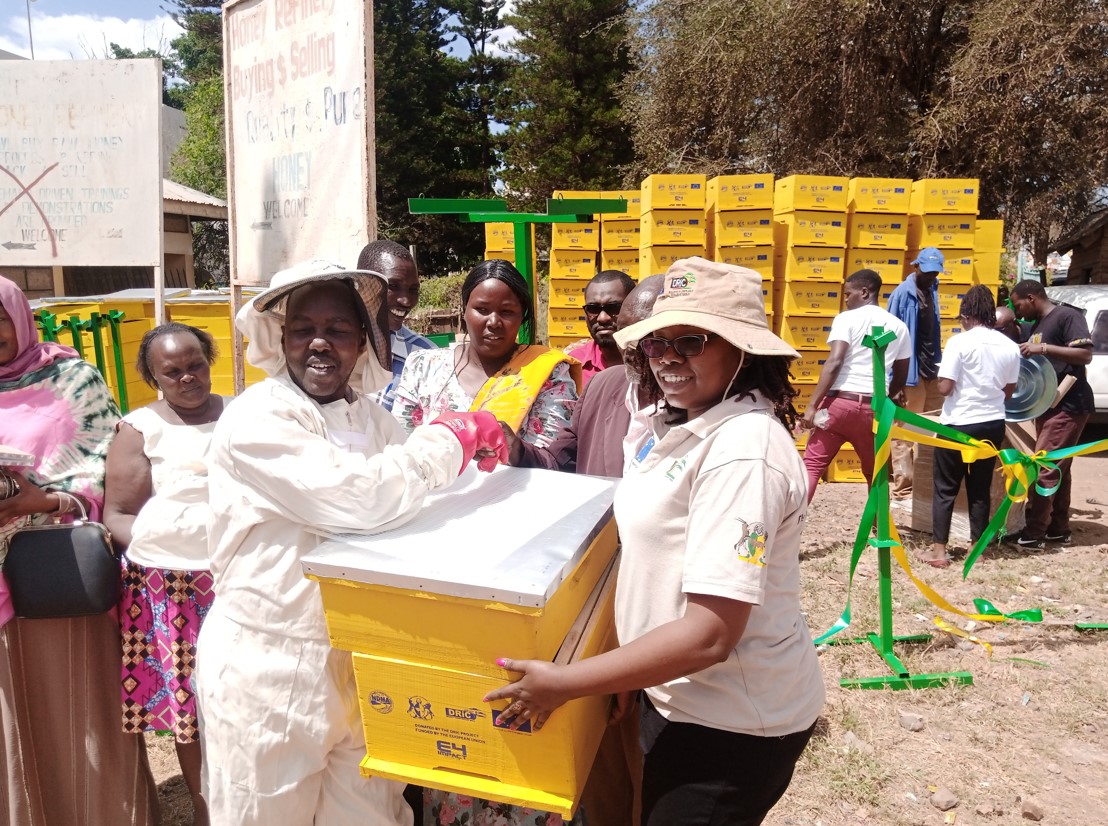Beekeeping fast becoming profitable venture for pastoralist women

Due to cultural barriers, women are not allowed to engage in any income-generating activity and have limited access to and control over resources which makes them solely rely on their husbands for all their needs.
With counties in Northern Kenya under immense threat due to frequent droughts that threaten pastoralism, local communities are slowly embracing alternative sources of livelihood.
Among the most hard-hit are women who have to walk longer distances in search of water for domestic and livestock use while also taking care of animals, which exposes them to the risk of being attacked in the grazing fields.
More To Read
- Wajir police nab suspect with AK-47 rifle in ongoing crackdown on illegal firearms
- Northern region MPs accuse President Ruto of ignoring region in State of the Nation Address
- Diamond Trust Bank lands in Garissa, ignites push for financial inclusion in northern Kenya
- Northern Kenya mourns Raila, remembers his legacy of inclusion and justice
- Treasury rolls out new plan to expand financial inclusion in Northern Kenya
- Multi-agency team recovers 17 stolen goats in Marsabit, suspect arrested
Due to cultural barriers, women are not allowed to engage in any income-generating activity and have limited access to and control over resources which makes them solely rely on their husbands for all their needs.
Besides involvement in local village loaning and savings associations which men are slowly embracing, some of the women in Isiolo have resorted to charcoal burning to fend for their families, consequently damaging the environment and worsening the effects of climate change.
Drought has also seen the region frequently experience depletion of pastures due to overgrazing, which sparks resource-based conflicts.
The effects of climate change which results in massive loss of livestock that die from hunger or are swept by flood waters as well as insecurity menace in the region continue to make pastoralism unreliable while impoverishing local communities, exposing them to hunger and malnutrition.
Following continued sensitisation on climate-friendly interventions to climate change, beekeeping which has traditionally been a preserve of men, is turning out to be a profitable venture for pastoralist women in Isiolo County.
Increasing honey production
A collaborative effort between the county government and E4Impact has seen 10 women groups from five wards each receive 10 Langstroth bee hives, equipment and accessories donations meant to promote diversification of livelihoods and increase local honey production.
The equipment and accessories include harvesting gear of a bee suit, gloves, gumboots and a smoker as well as a 200-litre stainless-steel tank.
 A group of Isiolo women being taught how to handle Langstroth bee hives on March 12, 2024. In a bee suit is Isiolo County Livestock Chief Officer Isaiah Epuri. (Photo: Waweru Wairimu)
A group of Isiolo women being taught how to handle Langstroth bee hives on March 12, 2024. In a bee suit is Isiolo County Livestock Chief Officer Isaiah Epuri. (Photo: Waweru Wairimu)
Due to inadequate training and the majority of the farmers producing honey for their consumption, the 1,100 bee farmers in the county produce a paltry 200 kilogrammes every harvest, reports show.
Among those who have embraced beekeeping as an economic activity is Abdia Gedi of the Ismat women group who previously relied on casual jobs.
"I used to fear bees, but after several training sessions, I appreciated their benefits. I am expecting to collect my first harvest in four months," she said.
Another farmer, Flavia Ekamais said the venture was contributing to the conservation of the environment through the protection of indigenous tree species while also cushioning them against the effects of climate change.
"We no longer cut down trees for charcoal burning, which ensures we protect the natural habitat of the bees," she said.
Northern Kenya which occupies more than 70 per cent of Kenya's land mass has a huge potential in the production of honey due to the arid conditions.
Isiolo County Livestock Production Chief Officer Isaiah Epuri said beekeeping would ensure sustainable land use and help conserve the rangelands.
Value-addition
During the distribution of the items at the Isiolo town honey refinery, Epuri said farmers will be supported to increase their productivity through value-addition and linking them to markets for increased income.
 A woman carries a Langstroth bee hive provided by the Isiolo County Government and E4Impact at the Isiolo town honey refinery on March 12, 2024. (Photo: Waweru Wairimu)
A woman carries a Langstroth bee hive provided by the Isiolo County Government and E4Impact at the Isiolo town honey refinery on March 12, 2024. (Photo: Waweru Wairimu)
"We are also working on standardising the product to rid the market of cheap and adulterated honey, laced with additives, being sold by rogue traders," he said, adding that the county targets to increase production to three tonnes per harvest
Apart from honey, the farmers will be assisted in making soaps, and candles while also extracting venom and propolis.
E4Impact Foundation Country Manager Bernadette Mutinda said the European Union-funded Drought Resilience (DRIC) programme was geared towards building resilience for women who are among the groups vulnerable to the effects of climate change.
"We will also link them to ready market and ensure they cash in from the venture," she said, adding that close monitoring and assessment will be done to ensure the farmers reap maximum benefits.
Api Culture Centre has already offered to purchase honey directly from the farmers, as long as it meets the required quality standards.
A kilo of honey fetches between Sh700 and Sh1,000 in the local market.
The farmers have also received a major boost following the launch of the County Beekeepers Association, which will give them bargaining power and manage the refinery centre.
Epuri assured of the county government's commitment to supporting local communities to diversify their livelihoods by embracing poultry farming and beekeeping, among other sub-sectors.
The demand for honey in Kenya remains high, with the local producers unable to satisfy the need, forcing the country to import from neighbouring countries such as Tanzania.
Ethiopia is the largest honey producer in Africa, followed by Tanzania, with Kenya ranking third, according to reports.
There are over 100, 000 beekeepers in Kenya who own more than two million bee hives and produce an estimated 20,000 metric tonnes.
Top Stories Today















































